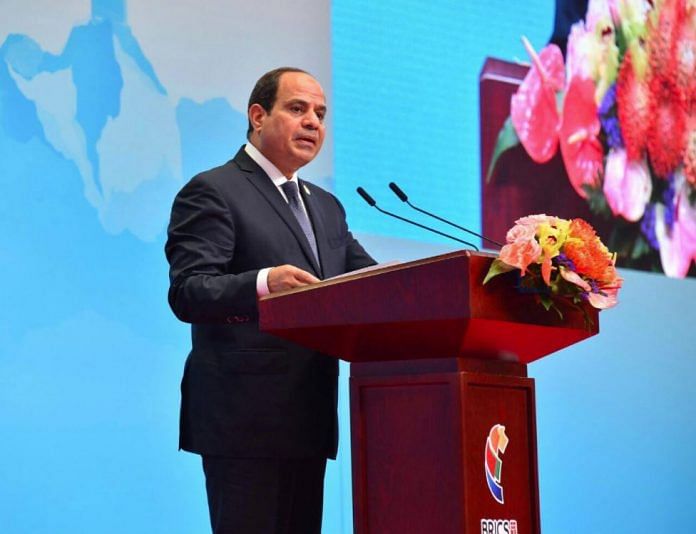Growing discontent among Egypt’s political elite and the military overshadow the presidential election at the end of March, even though Sissi will most definitely be re-elected. Meanwhile, democracy in Tanzania is in peril, and Theresa May should consider hitting Russia where it hurts— and go after the rich Russian oligarchs in Britain.
The beginning of Sissi’s fall
“Egypt is approaching a critical moment,” writes Bahey Eldin Hassan in the Washington Post. Egypt’s president, Abdel Fatah al-Sissi has been becoming increasingly unpopular. While he will win the sham presidential election scheduled for the end of this month, his second term might not last very long.
“Sissi has unleashed a crackdown on dissent that has no parallel in the country’s modern history. Yet this campaign is falling short of its intended objectives. Now discontent is brewing among the ruling elite, including the military. This is a much more serious threat to the president than Islamist and secular opposition.”
“After Sissi failed in his bid to amend the constitution, which would have extended the presidential term from four to six years and enabled him to avoid holding elections this year, he embarked on an effort to ensure victory by preventing his fiercest opponents from running,” writes Hassan.
A genuine power struggle is underway, he writes. The army’s discontent stems from Sissi’s decision to transfer to sovereignty of two Egyptian islands to Saudi Arabia, foreign media reports that Sissi is preparing to give up parts of the Sinai, and the government’s failure to respond effectively to terrorism.
This is why Sissi has been attending several military and police ceremonies recently, instead of campaigning for reelection. He’s been wearing his full military uniform to appeal to the forces, even though serving members don’t have the right to vote.
“If the elections go according to plan, Sissi’s second term is likely to be turbulent. But there are broader questions that are worth urgent consideration: What will be the ultimate cost of his attempts to secure his personal rule, and what will be the repercussions for stability in Egypt and the region,” hassan asks.
The most effective way to go after Putin: money
After the attempted assassination of a former Russian double agent, Sergei Skripal, and his daughter, British Prime Minister Theresa May had to take some action, writes Misha Glenny in the New York Times. Skripal and his daughter appear to have been poisoned with a Russian-made nerve agent.
“On Wednesday, Mrs. May announced her decision: the expulsion of 23 Russian diplomats who Britain believes are engaged in espionage. It was not an insignificant move, and Russia has indicated it will respond with tit-for-tat expulsions.”
Theresa May, Glenny writes, is Britain’s weakest prime minister to assume office sine World War II. Brexit was a polarizing experience, because of which May will have to tread carefully. May doesn’t fare much better on the world stage. “Mr. Putin may have realized how weak Mrs. May is, which is why he would decide to act now to take revenge on a man he sees as a traitor and to cause Britain new headaches,” Glenny explains.
“But the prime minister should have gone in harder. If she really wanted to teach Russia a lesson, she should have announced measures allowing her government to scrutinize the billions of dollars invested in Britain by Russian oligarchs and their associates, some of whom have criminal or intelligence backgrounds. This kind of transparency would hit President Vladimir Putin and his allies where it hurts most: their bank accounts,” Glenny writes.
“Britain needs to make a concerted effort to ascertain where all of this fabulous wealth comes from. Russian oligarchs have made an indelible mark on London. Some own newspapers, others our most successful soccer clubs, while many more own huge chunks of high-end property in the most fashionable parts of the capital.” And many of them are close collaborators and friends of Putin.
“If Moscow is indeed responsible for the poisoning of Mr. Skripal and his daughter, then the attempted murders look like another tactic in a strategy that seeks to exploit the political vulnerabilities of our democracies. But unlike fake news and the meddling in elections, this one could prove deadly,” Glenny writes.
Tanzania’s political instability
“The white beach of Dar es Salaam may seem enticing. Yet the bodies that have washed up on it, almost in sight of the city’s glistening offices and hotels, are a sign of Tanzania’s sickening lurch to despotism. Opposition politicians are being shot; activists and journalists are disappearing,” writes The Economist.
John Magufuli, Tanzania’s authoritarian and erratic president, is now in his thrid term — and seems prepared to undo a lot of what Tanzania has achieved in the past. Tanzani’s first prime minister, Julius Nyerere was a founding father of post-colonial Africa, and implemented his “African socialism” which actually resulted in economic chaos and hunger. “Even so, he sought to unite his country in a region where many clung to power by stoking tribal tensions. He was, in general, less repressive than many of his peers. And by sending his troops into Uganda, he got rid of Idi Amin, one of the world’s nastiest dictators. ”
“More recently, with the restoration of multiparty democracy in 1994, Tanzania has been the darling of investors. Its output has grown on average by about 6.5% a year for the past decade. It has attracted foreign direct investment worth an average of 4% of GDP each year. Tanzanians are now about twice as rich as they were in 1990.”
“Yet this progress is imperilled by Mr Magufuli, who is transforming a stable, if flawed, democracy into a brutal dictatorship.”
“For Western donors to look away as Tanzania descends into oppression would be to discard much of its progress in recent decades. Most of all, Tanzania’s neighbours need to act. Failing to stand up for the rule of law is to encourage other would-be despots to do their worst.”



